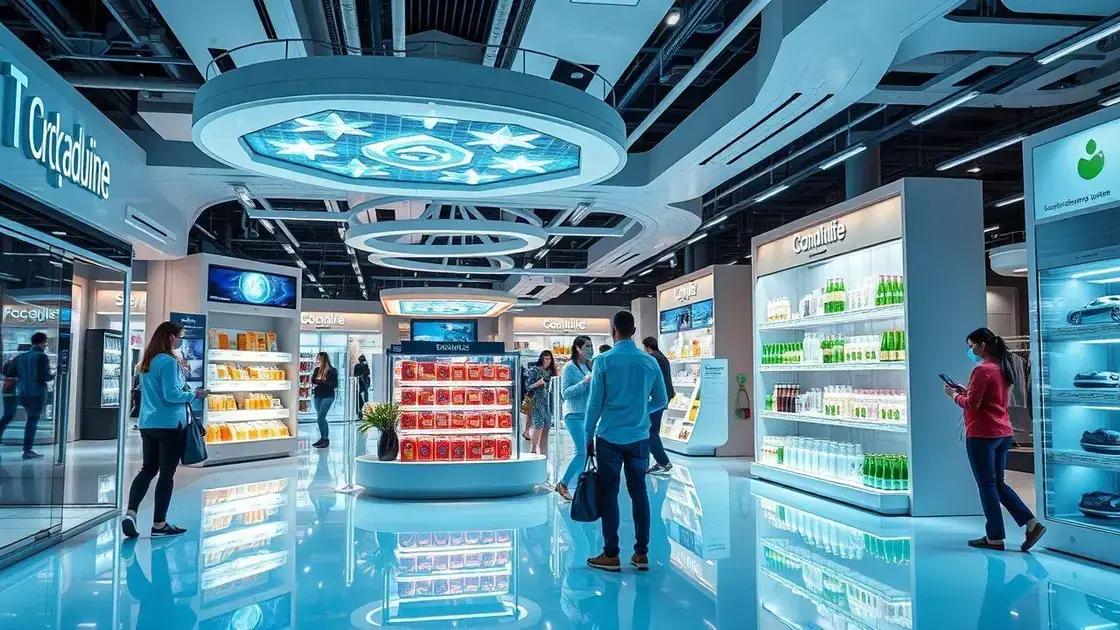AI-driven personalization in U.S. retail: boost sales now
AI-driven personalization in U.S. retail enhances the shopping experience by providing tailored recommendations, utilizing augmented reality, and improving customer service with instant chatbots, all while promoting sustainability.
AI-driven personalization in U.S. retail is changing how we shop. Ever thought about how recommendations seem tailored just for you? Let’s dive into how this technology shapes consumer experiences.
Understanding AI-driven personalization
Understanding AI-driven personalization is essential for grasping how today’s retail experiences are evolving. More than just a trend, this technology shapes the way customers interact with brands.
To start, AI-driven personalization uses data and algorithms to tailor shopping experiences specifically for individuals. This means the products you see online could be different from those your friend sees, all based on previous interactions and preferences.
The Role of Data
Data is at the very core of personalization efforts. Retailers gather a wealth of information through various channels, including:
- Customer purchase history
- Browsing behavior on websites
- Feedback and product reviews
- Social media interactions
This data allows businesses to understand their customers better. They can analyze shopping habits and preferences, leading to more relevant product suggestions.
Moreover, algorithms help in predicting what products a customer might be interested in. Retailers harness machine learning to refine these predictions over time, improving personalization. This leads to a unique shopping experience that feels tailored specifically to each individual.
Benefits of Personalization
The benefits of AI-driven personalization are significant for both consumers and retailers. Customers enjoy a more engaging shopping experience, while retailers can see benefits such as:
- Increased customer loyalty
- Higher conversion rates
- Enhanced customer satisfaction
When customers feel understood by a brand, they are likely to return for repeat purchases. This creates a win-win situation where both parties benefit. The synergy between consumer satisfaction and business profits makes personalization a valuable strategy in retail today.
As technology progresses, expectations rise. Consumers will continue to expect that brands deliver experiences that align closely with their preferences. AI-driven personalization is not just a temporary solution; it is a crucial component of modern retail.
Benefits of AI in retail for consumers

The benefits of AI in retail for consumers are transformative. Customers are experiencing shopping like never before, thanks to advancements in technology. With AI, shopping is becoming faster, more personalized, and convenient.
Many retailers are leveraging AI to enhance the customer experience. For instance, AI helps in understanding consumer preferences better. It tracks what you like based on past purchases and browsing history.
Enhanced Shopping Experience
By using AI, retailers can offer:
- Tailored product recommendations
- Dynamic pricing based on demand
- Custom promotions just for you
This level of customization means you see products that actually match your taste and needs. Additionally, AI chatbots provide instant assistance, answering questions in real-time. This leads to a smoother shopping journey.
The convenience of online shopping is elevated through AI. For example, AI-powered voice assistants can help you find products with simple commands. You can ask for specific items or categories, making the shopping process effortless.
Saving Time and Money
AI not only enhances experience but also saves your time and money. With smart algorithms, deals and discounts are tailored to your shopping habits. Consumers can find better prices and save on their purchases. Retailers focus on bringing you the best offers without overwhelming you with irrelevant ads.
Moreover, AI analyzes trends in consumer behavior, allowing retailers to stock products that customers really want. This helps in reducing waste and unnecessary expenses, further benefiting consumers.
Overall, the integration of AI into retail is boosting satisfaction levels among shoppers. AI in retail for consumers is paving the way for a new era, where shopping feels more intuitive and enjoyable.
Real-world applications of AI personalization
Real-world applications of AI personalization are making waves across various industries. Brands are increasingly realizing the potential of artificial intelligence to cater to customer needs effectively. This technology can be seen in action in many retail settings, transforming the way we shop.
For instance, consider how online retailers use AI algorithms to provide personalized recommendations. When you browse a website, AI analyzes your past behavior, suggesting items that align with your preferences. This not only enhances the shopping experience but also increases the likelihood of purchases.
Dynamic Online Shopping
Many e-commerce platforms utilize advanced AI personalization techniques to optimize user experience. These include:
- Customized landing pages based on user behavior
- Targeted email marketing with product recommendations
- Personalized discounts and offers for loyal customers
This level of personalization turns a mundane shopping activity into a unique experience tailored just for you. The focus on customer preferences helps in building stronger relationships between consumers and brands.
In brick-and-mortar stores, AI personalization is also becoming prevalent. Retailers are implementing smart mirrors and digital signage to provide personalized shopping experiences. These technologies can suggest clothing items based on what a customer has previously tried on or their fashion preferences.
Customer Service Enhancements
AI-powered chatbots play a significant role in enhancing customer service. They provide instant assistance, answering queries anytime, anywhere. These chatbots can tailor responses based on past interactions, making them feel more personal. Customers appreciate quick answers without the hassle of waiting.
In addition, businesses can gather valuable insights from these interactions. By analyzing customer inquiries, retailers can improve their products and services further. This continuous feedback loop enables brands to stay in tune with what their customers want.
Overall, the real-world applications of AI personalization illustrate how businesses can create a more engaging and satisfying shopping experience. As technology continues to evolve, the potential for further innovations in this area is immense.
Future trends in retail technology

The future trends in retail technology are exciting and full of potential. As technology keeps evolving, the retail landscape is changing rapidly. Companies are adopting innovative solutions to enhance customer experiences and streamline operations.
One major trend is the integration of artificial intelligence. Retailers are increasingly using AI to analyze customer data and predict shopping behaviors. This means personalized recommendations will become even more accurate as technology learns from consumer patterns over time.
Augmented Reality in Shopping
Another trend garnering interest is augmented reality (AR). AR allows customers to visualize products in their own environments before making a purchase. This can include:
- Trying on clothes virtually
- Visualizing furniture in their living spaces
- Interacting with products in a more immersive way
This technology can enhance consumer confidence, reducing the likelihood of returns and improving overall satisfaction.
Additionally, retailers are looking to enhance the in-store experience. More stores are implementing smart technology. From smart carts that guide shoppers through aisles to checkout-free shopping experiences, future trends in retail technology are all about convenience.
Sustainability and Technology
Sustainability is also becoming a focus in retail technology. More companies are investing in green technologies, emphasizing eco-friendly practices. Customers today appreciate brands that are committed to sustainability. Using technology not only helps businesses streamline operations but also supports environmental initiatives.
For instance, retailers are integrating solutions to minimize waste and improve energy efficiency. This aligns the shopping experience with consumers’ values, making it a win-win for both parties.
As we look ahead, it is clear that the future trends in retail technology will prioritize customer-centric approaches while embracing sustainability and innovation. Retailers that adapt to these changes will likely thrive in a competitive environment.
AI-driven personalization is revolutionizing the retail world. As technology advances, shoppers can expect tailored experiences that cater to their individual preferences. Retailers adopting AI can enhance customer satisfaction, save time, and improve sales. Moreover, future trends suggest an exciting evolution with augmented reality, sustainability, and smart technologies. Embracing these changes will not only benefit retailers but will also lead to happier, more engaged customers.
FAQ – Frequently Asked Questions about AI-driven Personalization in Retail
How does AI improve the shopping experience?
AI improves the shopping experience by providing personalized recommendations based on past behaviors, making it easier for consumers to find what they want.
What role does augmented reality play in retail?
Augmented reality allows customers to visualize products in their own space before purchase, enhancing their confidence and satisfaction with their buying decisions.
Why is sustainability important in retail technology?
Sustainability is important because consumers are increasingly looking for brands that are eco-friendly. Technologies that reduce waste and promote green practices attract more customers.
How can chatbots enhance customer service?
Chatbots provide instant support by answering queries 24/7, helping customers find information quickly and improving overall customer satisfaction.





